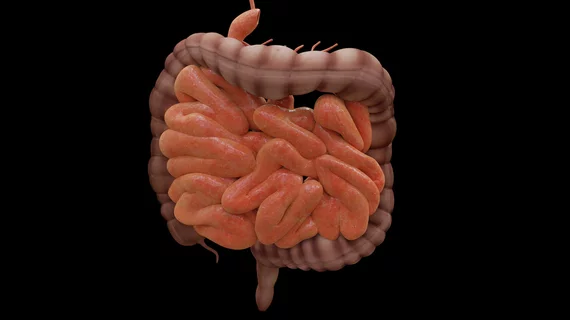AI helps reading-room radiologists differentiate colon cancer from diverticulitis
A deep learning algorithm for CT has achieved excellent accuracy separating colon cancer from acute diverticulitis.
What’s more, in a new study recreating reading-room conditions, the model augmented and significantly improved diagnostic performance for board-certified radiologists as well as radiology residents.
The algorithm, a 3D convolutional neural network (CNN), was developed and validated by radiologists and surgeons at Technical University of Munich in Germany.
JAMA Network Open published the team’s report online Jan. 27 [1].
Sebastian Ziegelmayer, MD, Rickmer Braren, MD, and colleagues worked with records of 585 patients who had CT imaging and surgery for either colon cancer or acute diverticulitis over a 15-year period ending in 2020.
To develop their model, the team used bounding boxes in the scans to manually mark out the diseased bowel along with adjacent membranes attaching the intestine to the abdominal wall.
They had 10 radiologists classify the findings in reading-room conditions with and without help from the CNN. Three of the readers were residents with fewer than three years of experience, four were residents with three or more years, and three were board-certified. Two of the latter were gastrointestinal subspecialists.
‘May significantly improve the diagnostic performance of radiologists, which may improve patient care’
En route to calculating the performance of all readers both with and without AI support, the researchers found the 3D CNN reached a sensitivity of 83.3% and specificity of 86.6% for a test set.
This compared with 77.6% mean sensitivity and 81.6% specificity for the unassisted radiologists.
When tapping the algorithm for support, the readers improved to 85.6% sensitivity and 91.3% specificity.
Additionally, when aided by the CNN, the readers significantly reduced their counts of false-negatives and false-positives, improving negative predictive values from 78.5% to 86.4% and positive predictive values from 80.9% to 90.8%.
From these results Ziegelmayer and co-authors conclude that a deep learning model able to distinguish colon cancer from acute diverticulitis on CT images “may significantly improve the diagnostic performance of radiologists, which may improve patient care.”
Perforation or none, ‘a precise classification of these diseases is important for patient triage’
In their discussion the authors remark that AI’s significant help differentiating colon cancer and acute diverticulitis on CT images has important clinical implications.
“In the perforated stage, both entities require emergency surgery; however, the surgical strategies differ,” they write. “Whereas colon cancer requires oncologic resection of the diseased bowel and the entire lymph node basin, a limited resection of the diseased bowel may suffice in cases of acute diverticulitis.”
More:
A high level of certainty in surgical planning improves patient stratification and thus limits postoperative complications and potentially decreases mortality rates. Particularly in cases of emergency surgery and in limited resource settings, a high level of diagnostic accuracy is indispensable. Even in the nonperforated stage, a precise classification of the diseases is important for patient triage.”
The study is available in full for free.

